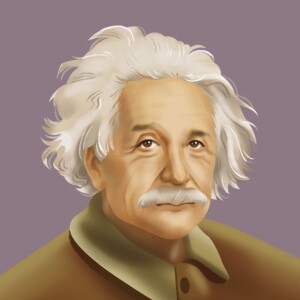Centro de libros de autoayuda
¡Hola a todos y bienvenidos al podcast! Aquí, donde la sabiduría se condensa en dosis concentradas, nos sumergimos en el fascinante mundo de los resúmenes de no ficción. Cada semana, exploramos los temas más relevantes e intrigantes del mundo actual, desde ciencia y tecnología hasta negocios y filosofía. ¿Te falta tiempo para leer esos largos libros que llevan meses en tu lista de pendientes? ¡No te preocupes! Nuestro equipo de expertos hace el trabajo por ti, destilando las ideas clave y enseñanzas cruciales en resúmenes breves y accesibles. Acompáñanos en este viaje de conocimiento, inspiración y crecimiento personal mientras desentrañamos juntos la esencia de lo mejor de la no ficción. ¡Empecemos! Website: https://bookeygetbooks.wixsite.com/bookeyes
Episodes

Thursday Dec 14, 2023
Thursday Dec 14, 2023
What is the moral lesson of Marie Curie?
The moral lesson of Marie Curie's life is perseverance and dedication towards one's goals. Despite facing numerous social and professional obstacles as a woman in a male-dominated field, Curie remained steadfast in her pursuit of scientific knowledge and breakthroughs.
Her unwavering determination and commitment to her work not only led her to become the first woman to win a Nobel Prize but also the only person to win Nobel Prizes in two different scientific fields (Physics and Chemistry). Her pioneering research on radioactivity laid the foundation for future advances in medical treatments and nuclear technology.
Another moral lesson from Curie's life is the importance of intellectual curiosity and the pursuit of knowledge for the betterment of humanity. Despite her immense success, Curie remained humble and focused on using her scientific discoveries to benefit society rather than personal gain. She worked as a dedicated teacher and actively supported the use of her research in medical applications during World War I.
Overall, Marie Curie's life teaches us the importance of perseverance, dedication, intellectual curiosity, and the pursuit of knowledge for the betterment of society, even in the face of adversity.
What happened to Marie Curie after her husband died?
After her husband, Pierre Curie, died in 1906, Marie Curie faced numerous challenges but continued her groundbreaking scientific work. She took over her husband's position as a professor at the University of Paris, becoming the first woman to hold such a position.
Marie Curie's research focused on radioactivity, and she continued to investigate the properties of radioisotopes and their applications in medicine. She also collaborated with other scientists and shared her knowledge with younger generations.
In 1911, she won the Nobel Prize in Chemistry, becoming the first person and the only woman to win Nobel Prizes in multiple fields (Physics in 1903 and Chemistry in 1911). Her scientific achievements were widely recognized, and she became an inspiration for other women interested in scientific pursuits.
However, her personal life faced difficulties. Marie's association with physicist Paul Langevin, who was married at the time, caused a scandal and attracted intense media attention. Despite the negative publicity and public scrutiny, Marie Curie maintained her commitment to her work and her scientific legacy.
In the later years of her life, Marie Curie continued her research and teaching activities. She established research laboratories and institutes, such as the Radium Institute, where she conducted more experiments and trained future scientists.
Marie Curie passed away on July 4, 1934, due to aplastic anemia, likely caused by her extensive exposure to radiation during her scientific work. Even after her death, her contributions to science continued to have a lasting impact, shaping the field of radioactivity and inspiring generations of scientists.
What is a short summary of Marie Curie?
Marie Curie, born Maria Skłodowska in 1867, was a Polish-born physicist and chemist who gained worldwide recognition for her groundbreaking research on radioactivity. She is the first woman to have received two Nobel Prizes and remains the only person to have received Nobel Prizes in two different scientific fields.
Curie's research on radioactivity was instrumental in leading to the development of new technologies in the field of medicine. She discovered the radioactive elements polonium and radium, and her work led to the creation of the theory of radioactivity.
Despite facing gender discrimination, Curie achieved remarkable success in her career. Alongside her husband Pierre Curie, she conducted ground-breaking experiments and became the first female professor at the University of Paris.
Marie Curie's dedication to scientific research and her contributions to the field not only revolutionized our understanding of radioactivity but also opened doors for future generations of women in science. She remains an inspiring figure and a symbol of perseverance and scientific excellence.

Wednesday Dec 13, 2023
Wednesday Dec 13, 2023
What debate is common in evolutionary psychology?
One common debate in evolutionary psychology is the degree to which human behavior is shaped by genetic factors (nature) versus environmental factors (nurture). While evolutionary psychologists generally agree that both nature and nurture play a role in shaping human behavior, the emphasis given to each factor can vary. Some researchers argue that human behavior is predominantly determined by evolutionary adaptations shaped by natural selection, suggesting a strong genetic influence. Others place greater emphasis on the role of social and cultural factors in shaping behavior, highlighting the importance of the environment. This debate often centers around topics such as mate selection, aggression, parenting, and cognitive abilities.
What did David Buss contribution to psychology?
Evolutionary Psychology: Buss has played a crucial role in popularizing and promoting the field of evolutionary psychology. He has emphasized the importance of studying human behavior from an evolutionary perspective, arguing that our behavior and psychological processes are shaped by natural selection and adaptive mechanisms.
Sexual Strategies Theory: Buss developed the Sexual Strategies Theory, which explores the differences between men and women in their mating strategies. The theory suggests that due to differences in reproductive biology and investment, men and women have evolved different psychological mechanisms and strategies to maximize their reproductive success.
Book publications: Buss has authored several influential books, such as "The Evolution of Desire: Strategies of Human Mating" and "The Handbook of Evolutionary Psychology." These books have helped to disseminate evolutionary psychology and its findings to a wider audience.
Cross-Cultural Studies: Buss has conducted extensive cross-cultural research to examine the universality of certain psychological phenomena and the impact of cultural differences on human behavior. His studies have explored topics such as mate preferences, jealousy, aggression, and sex differences across various cultures and societies.
Overall, David Buss's contributions have greatly advanced our understanding of human behavior, mating strategies, and the role of evolution in shaping our minds. His work continues to be influential in the field of evolutionary psychology and beyond.
Evolutionary Psychology book summary
Evolutionary Psychology: The New Science of the Mind is a groundbreaking book written by David Buss. It provides a comprehensive overview of the field of evolutionary psychology, which seeks to understand how our mental and behavioral traits have evolved through the process of natural selection.
The book begins by outlining the core principles of evolutionary psychology, emphasizing that our minds are composed of many specialized modules that have evolved to solve specific adaptive problems. These modules include traits such as mating strategies, aggression, cooperation, social exchange, and parental investment.
Buss explores various aspects of human behavior through an evolutionary lens, discussing topics such as sexual selection, jealousy, infidelity, mate preferences, emotions, altruism, and the relation between behavior and genes. He argues that evolutionary psychology provides a unique perspective in explaining human nature and sheds light on universal patterns of behavior found across different cultures.
One of the key themes in the book is the idea that our minds have been shaped by the forces of evolution to solve ancestral problems. Buss argues that by understanding the evolutionary origins of our behavior, we can gain insights into our modern-day actions and motivations. For example, he discusses how evolutionary pressures have shaped our preferences for physical attractiveness or our capacity for jealousy and mate guarding.
Buss also addresses criticisms and challenges to the field of evolutionary psychology, recognizing the complex interplay between genes and the environment, as well as cultural influences on behavior. He emphasizes the need for interdisciplinary research and collaboration in understanding the complexities of human behavior from an evolutionary perspective.
Overall, Evolutionary Psychology: The New Science of the Mind offers a comprehensive and accessible introduction to the field of evolutionary psychology. It provides readers with a new way of understanding human behavior by exploring the deep evolutionary roots that shape our minds and actions.

Tuesday Dec 12, 2023
Tuesday Dec 12, 2023
Madame Curie book summary
"Madame Curie" is a biography written by the Polish author Eve Curie about her mother, the renowned scientist Marie Curie. The book provides a detailed account of Marie Curie's life, from her childhood in Poland to her groundbreaking discoveries in the field of radioactivity.
The story begins by delving into Marie Curie's early years, describing her upbringing in a loving but impoverished family. Despite facing numerous obstacles, Curie's determination and passion for learning eventually led her to study physics and chemistry at the Sorbonne in Paris.
The book then highlights Marie Curie's career and accomplishments, particularly her groundbreaking work on radiation. Together with her husband, Pierre Curie, Marie conducted groundbreaking research on radioactivity, leading to the discovery of new elements such as polonium and radium. These discoveries not only revolutionized the field of science but also earned Curie the distinction of being the first woman to win a Nobel Prize.
The biography also explores the personal challenges and sacrifices that Marie Curie faced throughout her life. It delves into her struggles as a female scientist in a male-dominated field, as well as the tragic loss of her beloved husband Pierre and the subsequent preparations she made for her daughters' futures.
The book also sheds light on Marie Curie's later years and her tireless efforts to promote the use of radiology in World War I, leading to the creation of mobile radiography units that saved countless lives. Her commitment to scientific discovery and her dedication to her work continued until her death in 1934.
Overall, "Madame Curie" is a captivating biography that showcases the extraordinary life and achievements of Marie Curie, highlighting her groundbreaking scientific contributions, her perseverance in the face of adversity, and her enduring legacy as one of the most influential scientists in history.
Quotes of Madame Curie book
"Nothing in life is to be feared, it is only to be understood. Now is the time to understand more, so that we may fear less."
"Be less curious about people and more curious about ideas."
"I am one of those who think that science has great beauty. A scientist in his laboratory is not only a technician: he is also a child placed before natural phenomena which impress him like a fairy tale."
"You cannot hope to build a better world without improving the individuals. To that end, each of us must work for our own improvement and, at the same time, share a general responsibility for all humanity."
"Nothing in life is to be accomplished without passion."
What are important facts about Madame Curie?
Madame Curie, whose full name was Marie Skłodowska Curie, was a Polish-born physicist and chemist. She later became a naturalized French citizen.
Curie is best known for her groundbreaking research on radioactivity, which earned her two Nobel Prizes. In 1903, she became the first woman to receive a Nobel Prize in Physics, and in 1911, she became the first person, and still the only woman, to receive a second Nobel Prize, this time in Chemistry.
She discovered two radioactive elements, polonium and radium, and coined the term "radioactivity" to describe the spontaneous emission of radiation.
Madame Curie's research was not only significant scientifically but also had important medical applications. During World War I, she developed mobile radiography units, commonly known as "petites Curies," to provide X-rays for diagnosing injuries on the battlefront.
Despite her achievements, Curie faced gender discrimination throughout her career. She often had to work in poorly equipped laboratories and struggled to be taken seriously in the male-dominated scientific community.
Curie's work with radioactive materials eventually led to health complications, and she succumbed to aplastic anemia, likely caused by long-term exposure to radiation, in 1934.
Her legacy lives on through the Curie Institute in Paris, France, which remains a leading research center for cancer treatment and continues to honor her contributions to science.
In recognition of her accomplishments, Curie's image and name have been commemorated in various ways. She has appeared on postage stamps, currency, and has been the inspiration for numerous books, movies, and plays.

Monday Dec 11, 2023
Monday Dec 11, 2023
What is evolutionary psychology theory?
Evolutionary psychology is a scientific discipline that seeks to understand human behavior and cognition by examining their evolutionary origins. It proposes that many aspects of human psychology, such as social behaviors, emotions, decision-making processes, and cognitive abilities, can be better explained by considering their adaptive functions in the context of evolutionary pressures. In other words, the theory suggests that human behavior and cognition have evolved over time to increase the chances of survival and reproductive success.
According to evolutionary psychology, many human behaviors and psychological traits can be traced back to our ancestors' need to adapt to their environment, find mates, compete for resources, and navigate complex social interactions. It seeks to uncover universal human tendencies and cognitive mechanisms that have been shaped by natural selection.
The theory argues that evolutionary pressures have resulted in the development of specific cognitive modules that help humans solve recurring adaptive problems. For example, the desire for sweet and fatty foods may stem from the ancestral need to consume energy-dense food sources, while humans' tendency to form coalitions and engage in group behaviors may have emerged as a way to enhance survival and cooperation.
While evolutionary psychology has generated significant research and insights into human behavior, it is important to note that it is not a complete explanation for all aspects of human psychology. Critics argue that it can oversimplify complex phenomena or overlook the influence of cultural and individual differences. However, evolutionary psychology remains a valuable framework for understanding the evolutionary roots of human behavior and cognition.
Why is Evolutionary Psychology a good book?
Comprehensive coverage: The book provides a comprehensive overview of the field of evolutionary psychology, covering a wide range of topics and theories. It explores how evolutionary principles can explain human behavior, cognition, emotions, social interactions, and various psychological phenomena.
Integration of biology and psychology: The book successfully integrates biological principles and psychological theories, demonstrating how evolution has shaped human psychology. It helps readers understand the biological and genetic basis of behavior, bridging the gap between biology and psychology.
Evidence-based approach: "Evolutionary Psychology" is grounded in scientific research and evidence, drawing on numerous studies and empirical data to support its claims. It presents a balanced view of evolutionary psychology, distinguishing between well-supported theories and hypotheses that require further research.
Accessibility: Despite its scientific nature, the book is written in a clear and accessible manner, making it suitable for both experts and general readers. It avoids excessive technical jargon, making complex concepts understandable without oversimplification.
Thought-provoking insights: "Evolutionary Psychology" offers thought-provoking insights into human behavior and psychology, challenging traditional psychological theories by providing an evolutionary perspective. It encourages readers to critically analyze and question existing psychological frameworks.
Practical implications: The book discusses the practical implications of evolutionary psychology, such as its relevance to understanding mental health, relationships, parenting, decision-making, and societal behavior. It helps readers apply evolutionary principles to real-life situations and gain a deeper understanding of human nature.
Ultimately, "Evolutionary Psychology" stands out as a good book due to its comprehensive coverage, evidence-based approach, accessibility, thought-provoking insights, and practical implications, making it a valuable resource for anyone interested in understanding human psychology from an evolutionary perspective.
Quotes of Evolutionary Psychology book
"Our minds have evolved to solve problems encountered by our ancestors in their ancestral environments." - David Buss
"Evolutionary psychology emphasizes the importance of genetic influence on human behavior." - Steven Pinker
"The mind is a computer designed by natural selection to extract information from the environment." - Leda Cosmides and John Tooby
"Evolutionary psychology suggests that many of our behaviors and cognitive abilities have evolved because they were adaptive in the past." - David Geary
"Evolutionary psychology provides insights into the mind, behavior, and culture by examining the adaptive functions of our psychological traits." - Satoshi Kanazawa
"Our preferences for certain traits in potential mates can be understood through the lens of evolutionary psychology." - David Buss
"Evolutionary psychology suggests that our emotions and behavior are shaped by natural and sexual selection." - John Alcock
"Our evolved tendencies for cooperation and competition play a crucial role in shaping our social behavior." - Robert Wright
"Evolutionary psychology explores how our ancestors' strategies for survival and reproduction influence our thoughts and actions today." - Mark van Vugt and Anjana Ahuja
"Evolutionary psychology can shed light on various aspects of human behavior, from mating preferences to parental investment." - Martie Haselton

Friday Dec 08, 2023
Friday Dec 08, 2023
Quotes of Salt book
"Don't judge each day by the harvest you reap but by the seeds that you plant." - Robert Louis Stevenson
"The difference between the impossible and the possible lies in a person's determination." - Tommy Lasorda
"In three words I can sum up everything I've learned about life: it goes on." - Robert Frost
"Be yourself; everyone else is already taken." - Oscar Wilde
"The best way to predict your future is to create it." - Abraham Lincoln
"Success is not final, failure is not fatal: it is the courage to continue that counts." - Winston Churchill
"The only way to do great work is to love what you do." - Steve Jobs
"Believe you can and you're halfway there." - Theodore Roosevelt
"Life is 10% what happens to us and 90% how we react to it." - Charles R. Swindoll
"Do not wait for the perfect moment, take the moment and make it perfect." - Zoey Sayward
What does salt represent in the book of salt?
Economic Power: Salt was crucial for preserving food before the advent of refrigeration. It became a valuable commodity, leading to the rise of salt trade routes and the establishment of salt-producing centers. Consequently, salt represented wealth and economic power.
Political Control: Control over salt production and distribution became a tool used by governments and rulers to assert control over regions. Salt taxes and monopolies were established to generate revenue and enforce authority. Salt thus symbolized political power and control.
Cultural Significance: Salt has played a significant role in different cultures throughout history. It has been used in rituals, religious ceremonies, and cultural practices. Its presence in various cuisines also reflects cultural identities and traditions. Therefore, salt serves as a symbol of cultural heritage.
Preservation and Stability: Salt's ability to preserve food allowed civilizations to thrive by preserving surplus during times of abundance for consumption during scarcity. It symbolizes stability, sustainability, and the idea of a secure future.
Salt book summary
"Salt: A World History" written by Mark Kurlansky, is a comprehensive and engaging exploration of the impact of salt on human civilization throughout history. The book highlights the essential role that salt has played in shaping and influencing various aspects of human life.
The book opens with a conversation about the origin of salt and its significance as a dietary necessity for human survival. It then delves into ancient history, examining how salt was used as currency, how it was vital for food preservation, and even how it played a role in religious rituals.
Kurlansky takes readers on a journey to various regions around the world, discussing how salt was obtained, produced, and traded. He explores the salt industry in countries such as China, India, and Africa, portraying their unique methods and techniques. The book also dives into the importance of salt in the exploration and colonization of the Americas, shedding light on the lucrative salt trade routes and its impact on the global economy.
The narrative continues by examining the influence of salt on political and social structures. The author explores how governments and rulers monopolized the salt industry to exert control over their populations. He also discusses the significance of salt taxation as a source of revenue for governments and its implications on economic inequalities.
Kurlansky doesn't shy away from discussing the darker aspects of salt production, such as the exploitation of workers and environmental degradation caused by the industry. He also addresses the consequences of the modern salt industry, including the health implications of excessive salt consumption.
In the final chapters, the author reflects on the future of salt, examining the controversies surrounding its consumption and considering potential alternatives.
Overall, "Salt: A World History" provides readers with a fascinating account of how this simple mineral has shaped human civilization in ways that may have often been overlooked or underappreciated. With its detailed research, the book offers a thought-provoking and educational perspective on the historical, cultural, economic, and social significance of salt throughout the ages.

Friday Dec 08, 2023
Friday Dec 08, 2023
What are the moral lessons in Animal Farm?
Power corrupts: One of the central themes of the novel is the corrupting nature of power. As the pigs gain control over the farm and establish their own hierarchy, they gradually abuse their power, becoming indistinguishable from the humans they initially rebelled against.
Equality and justice are fragile: Animal Farm explores the idea that ideals such as equality and justice are easily undermined and eroded by selfishness and the desire for power. The pigs' gradual erosion of the original commandments and their alteration of the farm's governance reflects this moral lesson.
Ignorance breeds manipulation: The animals on the farm are easily manipulated due to their lack of knowledge and education. This highlights the importance of critical thinking, education, and being informed to prevent falling victim to propaganda and manipulation.
Unity and collective action are necessary for change: The initial rebellion on Animal Farm occurs through the unity and common goal of the animals. However, as the pigs take over, the animals become divided, leading to their downfall. The novel underscores the significance of unity and collective action to resist tyranny and maintain a just society.
Language can be manipulated to control and deceive: Animal Farm explores how language can be manipulated to distort reality and deceive others. The pigs use propaganda and rhetoric to justify their actions and maintain control over the other animals. This demonstrates the importance of being aware of the manipulation of language and critically analyzing the messages conveyed.
Overall, Animal Farm serves as a cautionary tale, reminding readers of the dangers of authoritarianism, the abuse of power, and the importance of remaining vigilant to protect democratic values and individual freedoms.
Why is Animal Farm book worth reading?
Firstly, it is a classic work of literature that has stood the test of time. It was written by George Orwell in 1945 but its themes and messages are still relevant and applicable today. The book explores important themes such as power, corruption, and the dangers of totalitarianism. By using allegorical characters, Orwell vividly depicts the ugly realities of authoritarian regimes and the potential for oppression and injustice.
Secondly, Animal Farm is a thought-provoking and satirical novel. It presents a fictional story about a group of animals who overthrow their human farmer to establish a new society based on equality and freedom. However, as the story unfolds, the animals' noble intentions are gradually corrupted, and power ends up in the hands of a few, mirroring the reality of many revolutions in history. The book's clever and witty narrative prompts readers to reflect on political systems, leadership, and the manipulative tactics used to maintain control.
Moreover, Animal Farm serves as a critique of human nature. It examines the flaws and weaknesses inherent in individuals and societies that make them susceptible to manipulation and oppression. By personifying animals and their characteristics, Orwell shows how power can corrupt even the noblest of intentions. This exploration of human nature invites readers to consider their own roles and responsibilities in shaping society and to question the structures and systems that govern them.
Finally, Animal Farm is a relatively short and accessible read, making it suitable for a wide range of readers. It is a book that can be enjoyed by both young adults and adults, and its clear and concise writing style makes it easy to follow and understand.
Overall, Animal Farm is worth reading because it offers valuable insights into politics, power dynamics, human nature, and the importance of vigilance in defending freedom and equality. It is a captivating and thought-provoking book that continues to resonate with readers around the world.
How does Animal Farm relate to real life today?
Animal Farm is a novel by George Orwell that uses animals to portray the political events and uprisings that took place during the Russian Revolution and leading up to the Soviet Union. The story serves as a cautionary tale about the corrupting nature of power and the dangers of totalitarianism. Despite being set in a specific historical context, Animal Farm holds relevance to real-life situations today in several ways:
Corruption and abuse of power: Animal Farm highlights how those in power often manipulate their positions for personal gain, leading to corruption and the erosion of freedoms. This theme remains relevant today as corrupt leaders, politicians, or corporations exploit their authority and exploit the system for personal benefits.
Propaganda and manipulation: The novel emphasizes the role of propaganda and misinformation in manipulating public opinion. This is still relevant today, with the spread of fake news and misinformation through social media platforms, leading to widespread confusion and manipulation of people's beliefs.
Inequality and exploitation: Animal Farm explores the theme of inequality and exploitation as the ruling class takes advantage of the working class. This mirrors real-life scenarios where socioeconomic disparities persist, with the wealthy and powerful exploiting or neglecting the needs of the less affluent.
Loss of individual freedoms: The novel depicts how the animals lose their basic rights and freedoms as the pigs consolidate power. This relates to real-life situations where authoritarian regimes or dictatorships suppress dissent, control the media, and curtail individual liberties.
Historical parallels: Although Animal Farm is based on the Russian Revolution, it serves as a broader critique of oppressive regimes throughout history. It can remind us of the dangers of totalitarianism, whether it be in historical contexts like Nazi Germany or contemporary situations where democratic institutions are threatened.
In summary, Animal Farm's themes of corruption, propaganda, inequality, loss of freedoms, and historical parallels make it relevant to real-life situations today, serving as a warning against the abuses of power and the erosion of democratic values.

Friday Dec 08, 2023
Friday Dec 08, 2023
Why is Atomic Habits book worth reading?
Clear understanding of habits: The book provides a comprehensive understanding of how habits work, explaining the science behind them and how they shape our lives. This knowledge is essential in effectively changing and forming new habits.
Practical strategies: Author James Clear offers practical strategies and techniques to help readers build good habits and break bad ones. He breaks down the habit-building process into manageable steps, making it easier for readers to implement and see real results.
Incremental improvements: The book emphasizes the power of small, incremental changes, known as atomic habits. Clear demonstrates that these small changes, when consistently applied, can lead to significant long-term improvements and personal growth.
Actionable advice: Each chapter of the book presents actionable advice supported by real-life examples and scientific research. Clear focuses on practical solutions rather than mere theoretical concepts, enabling readers to apply the concepts immediately.
Clarity and simplicity: The writing style is clear, concise, and easy to understand. The concepts are presented in a straightforward manner, making them accessible to readers from various backgrounds.
Wide applicability: The principles and strategies described in the book can be applied to various areas of life, including personal, professional, and health-related goals. Whether readers seek to improve their productivity, fitness, relationships, or overall well-being, the techniques in Atomic Habits can be customized to suit their specific needs.
Long-lasting impact: With a focus on building sustainable habits, the book helps readers create lasting changes rather than relying on short-term fixes. It equips readers with tools to continually improve and maintain progress throughout their lives.
Overall, Atomic Habits provides a valuable framework for understanding and implementing effective habits, offering practical advice supported by scientific evidence. It is an essential read for anyone looking to improve their habits and create positive, lasting change in their lives.
The author of Atomic Habits book
The author of Atomic Habits is James Clear. He is an American author, speaker, and productivity expert who focuses on habits, decision making, and continuous improvement. Clear is widely recognized for his practical approach to developing and mastering productive habits through small incremental changes. He combines psychological insights with practical strategies to help readers and audiences make lasting changes and achieve their goals.
Clear's work has been featured in various publications, including The New York Times, Time, and The Wall Street Journal. He regularly speaks at conferences, corporations, and universities, sharing his insights on how to build better habits and break bad ones.
Atomic Habits, published in 2018, is Clear's most notable and highly acclaimed book. It explores the idea that small habits, when repeated consistently over time, can have a profound impact on one's personal and professional life. The book provides practical strategies and techniques to create and maintain good habits, break bad ones, and optimize the environment for lasting behavioral change.
Clear's writing style is engaging and accessible, making complex concepts easy to understand and implement. His approach to habit formation emphasizes the importance of identity and focuses on building systems rather than relying solely on willpower.
Overall, James Clear's Atomic Habits has become a popular resource for individuals seeking to improve their productivity, make positive changes, and create long-lasting habits.
What is book Atomic Habits about?
"Atomic Habits" is a book written by James Clear, which focuses on the idea that making small changes in our daily habits can have a significant impact on our lives. The book provides practical techniques and strategies to help readers develop good habits and break bad ones. Clear explains how habits work, discusses the importance of habit stacking and habit tracking, and emphasizes the power of marginal gains. He also explores the role of identity and mindset in shaping our habits and offers strategies for making habits easy and enjoyable to adopt. Additionally, the book includes various real-life examples and scientific research to support its concepts and recommendations. Overall, "Atomic Habits" aims to guide readers in creating a system that enables them to achieve their goals by focusing on small, incremental improvements in their habits.

Friday Dec 08, 2023
Friday Dec 08, 2023
What was Einstein's famous question?
Albert Einstein is known for asking many thought-provoking questions throughout his life and career as a physicist. However, one of his most famous questions is often referred to as "Einstein's elevator question" or "Einstein's elevator thought experiment." This question is used to illustrate the principle of equivalence in his theory of general relativity.
Einstein's elevator question goes like this: If someone is in a windowless elevator that is accelerating upwards at a rate equal to the acceleration due to gravity on Earth, would they be able to determine whether they are in an elevator or in a stationary room on the surface of the Earth?
Einstein used this question to challenge the prevailing understanding of gravity at the time. According to his theory of general relativity, gravity is not a force but rather the curvature of spacetime caused by the presence of mass and energy. In this thought experiment, the elevator is accelerating upwards, and the person inside feels a force similar to the force of gravity. Therefore, Einstein argued that there would be no experiment an observer could perform to determine whether they are in an elevator accelerating upwards or in a stationary room on Earth feeling the force of gravity.
This thought experiment highlights the principle of equivalence, which states that gravitational forces are indistinguishable from the inertial forces experienced in an accelerated reference frame. It revolutionized our understanding of gravity and had a profound impact on the development of modern physics.
What did Einstein fail to solve?
Albert Einstein was one of the greatest theoretical physicists of all time, but there were a few scientific puzzles that he was not able to solve during his lifetime. Some of the notable unsolved problems that Einstein grappled with include:
Unified Field Theory: Throughout his career, Einstein sought to unify the two pillars of theoretical physics: general relativity, which describes gravity, and quantum mechanics, which explains the behavior of subatomic particles. He spent the later years of his life in pursuit of a theory that could unite these two fundamental forces, but he was not successful in finding a complete solution.
The Quantum Measurement Problem: Einstein famously disagreed with the probabilistic nature of quantum mechanics, objecting to the idea that the behavior of particles can only be described by probabilities rather than definite properties. He criticized the theory by stating "God does not play dice with the universe." Although his arguments stimulated discussions and research in the field, a satisfactory solution to the measurement problem, which concerns the collapse of the wave function upon measurement, remains elusive.
Black Holes: Despite his groundbreaking work on general relativity, which predicted the existence of black holes, Einstein did not fully understand the nature of these cosmic entities. In fact, he even doubted their existence for a portion of his career. It was not until many years later, after his death, that scientists were able to grasp the complexities of black holes more comprehensively.
Cosmological Constant: In his formulations of general relativity, Einstein introduced a parameter called the cosmological constant. He initially included it to account for a static universe but later discarded it when the expansion of the universe was discovered. However, recent observations suggest the existence of dark energy, which might be related to an effective cosmological constant. Although Einstein's equations are not inconsistent with such an idea, his original motivation for introducing it remains unanswered.
While Einstein's inability to solve these problems does not diminish his scientific contributions, they continue to challenge physicists to this day and serve as the foundation for ongoing research in theoretical physics.
What was Einstein's successful story?
Albert Einstein's successful story is primarily centered around his groundbreaking work in the field of theoretical physics. One of his most notable achievements was the formulation of the theory of relativity, which revolutionized our understanding of space, time, and gravity.
Einstein's theory of relativity, published in 1915, presented a new framework for understanding the fundamental laws of physics. It challenged Newtonian mechanics by demonstrating that the laws of physics remain the same for all observers, regardless of their relative motion. This led to the famous equation E=mc², which expressed the equivalence of mass and energy.
The theory of relativity greatly influenced various scientific disciplines and had significant practical applications. For instance, it played a crucial role in the development of technologies such as nuclear power and GPS systems.
Einstein's remarkable contributions to physics earned him global recognition, and he was awarded the Nobel Prize in Physics in 1921 for his explanation of the photoelectric effect. However, his legacy extends far beyond this honor. He became an iconic figure, known not only for his scientific brilliance but also for his advocacy for peace, civil rights, and humanitarian causes.
Einstein's success extended beyond academia as well. He held various prestigious positions, including a professorship at the University of Berlin and directorship of the Kaiser Wilhelm Institute for Physics in Berlin. He also became a prominent figure in the international scientific community, collaborating with other renowned physicists and contributing to the establishment of the Hebrew University of Jerusalem.
Overall, Einstein's successful story lies in his groundbreaking contributions to science, the profound impact of his theories, and his lasting influence on our understanding of the universe. His legacy continues to inspire future generations of scientists and intellectuals.

Friday Dec 08, 2023
Friday Dec 08, 2023
Why is Jerusalem:The Biography important?
Historical significance: Jerusalem has a rich and complex history, with religious, cultural, and political associations dating back thousands of years. Montefiore's book meticulously traces Jerusalem's history from its ancient origins to the present day, offering readers a deeper understanding of the city's historical significance.
Cultural and religious importance: Jerusalem is considered a holy city by Judaism, Christianity, and Islam. Its significance to these three major world religions and the conflicts and tensions that have arisen throughout history make it a crucial subject of study. Montefiore delves into the religious and cultural aspects of Jerusalem, exploring the various religious sites and their importance to believers.
Political and geopolitical relevance: Jerusalem's significance goes beyond religion and culture; it has been at the center of political conflict for centuries. Montefiore analyzes various political entities that have controlled Jerusalem throughout history, such as the ancient empires, the Crusaders, the Ottoman Empire, and the modern state of Israel. The book sheds light on the geopolitical challenges and conflicts that have shaped Jerusalem and the broader Middle East region.
Balanced perspective: Montefiore's book offers a balanced and nuanced perspective on Jerusalem's history, incorporating multiple viewpoints and narratives. It explores the city's multiculturalism, highlighting the interactions and coexistence of different religious and ethnic groups, as well as the conflicts and divisions that have emerged.
Overall, Jerusalem: The Biography is important because it provides readers with a comprehensive understanding of the city's multifaceted history, culture, and religious significance. It offers insights into the complexities and challenges faced by Jerusalem and serves as a valuable resource for scholars, historians, and anyone seeking to deepen their knowledge of this extraordinary city.
What can we learn from Jerusalem:The Biography book?
Jerusalem: The Biography by Simon Sebag Montefiore is an extensive and detailed account of the history of Jerusalem. From its early beginnings to modern times, the book provides valuable insights and lessons about various aspects of the city, including its religious significance, political struggles, cultural development, and the impact of different empires and civilizations.
Historical and religious significance: The book highlights the immense importance of Jerusalem to multiple religious traditions, particularly Judaism, Christianity, and Islam. It explores the city's role as a spiritual and religious center, shedding light on the impact of various religious movements and conflicts throughout history.
Political struggles and power dynamics: Jerusalem has been a site of frequent conflicts and power struggles due to its strategic location and religious significance. The book chronicles the conquests, invasions, and sieges by different empires and dynasties, revealing the constant struggle for control over the city. It demonstrates how political changes shaped the city's fate and its residents' lives.
Cultural and architectural evolution: Jerusalem has witnessed the rise and fall of various civilizations, each leaving its mark on the city's architecture, culture, and traditions. The book explores the development of the city's architecture, from ancient times to the modern era, showcasing the blend of different architectural styles and influences. It also delves into the cultural evolution of Jerusalem, including the preservation and transformation of traditions and customs.
Lessons on coexistence and conflict: Jerusalem's history is marked by both instances of harmony and periods of intense conflict between different religious and ethnic groups. The book highlights these episodes, providing insights into the dynamics of coexistence and conflict resolution. It offers lessons on the challenges and possibilities of interfaith dialogue and understanding.
Relevance to contemporary issues: Though primarily focused on the historical context, Jerusalem: The Biography draws parallels to contemporary issues faced by the city and its inhabitants. It offers perspectives on the ongoing Israeli-Palestinian conflict, the challenges of maintaining religious peace and coexistence in a diverse society, and the complexities of balancing historical preservation with modern development.
Overall, Jerusalem: The Biography is a rich source of knowledge and understanding about the history and significance of Jerusalem. It provides insights and lessons on historical events, religious conflicts, cultural transformation, and the complexities of managing a city with such profound religious and political importance.
What is Jerusalem Simon Sebag Montefiore about?
"Jerusalem" by Simon Sebag Montefiore is a comprehensive and detailed historical account of the city of Jerusalem. The book chronicles the political, religious, and cultural history of Jerusalem from its earliest beginnings to the present day. Montefiore explores various aspects of the city's history, including the rise and fall of empires, conflicts between different religious and ethnic groups, and the significance of Jerusalem in various faiths such as Judaism, Christianity, and Islam. The book provides a nuanced understanding of the city's complex and often turbulent history, shedding light on its importance and the deep-rooted connections it holds for different communities.

Thursday Dec 07, 2023
Thursday Dec 07, 2023
The Road Less Traveled book summary
"The Road Less Traveled" is a self-help book written by psychiatrist and author Dr. M. Scott Peck. It was first published in 1978 and has since become a bestseller, providing valuable insights and guidance on personal growth, relationships, and spiritual development.
Discipline: The first section emphasizes the importance of discipline as the foundation for personal growth. Peck argues that discipline involves accepting responsibility for one's actions, embracing delayed gratification, and consistently making choices that align with one's values. He explains that life is difficult and filled with challenges, and it is through discipline that individuals can overcome these challenges and find true fulfillment.
Love: In the second section, Peck explores the concept of love and how it can be applied to relationships. He differentiates between "falling in love" and "real love," explaining that the former is often based on fantasy and infatuation, while the latter requires conscious effort and genuine care for another person. Peck emphasizes the importance of honesty, communication, and flexibility in building healthy and lasting relationships.
Growth and Religion: Peck delves into the role of growth and spiritual development in the third section. He suggests that personal growth comes from embracing and overcoming challenges, accepting responsibility for one's own happiness, and developing a strong sense of purpose. Peck also explores the connection between spirituality and religion, noting that while religion can provide structure and guidance, it should not become a substitute for personal growth.
Grace: The final section focuses on the concept of grace, which Peck defines as "the force or power by which we fulfill our potentialities." He explains that experiencing grace involves surrendering control and allowing oneself to be guided by a higher power or inner wisdom. Peck emphasizes the importance of humility, gratitude, and acceptance in connecting with grace.
Overall, "The Road Less Traveled" offers a thought-provoking exploration of personal development, relationships, and spirituality. The book encourages readers to take responsibility for their own happiness, make conscious choices, and embrace the challenges of life in order to find true fulfillment.
Why did author choose the road less traveled?
The phrase "the road less traveled" is often used to refer to taking a path that is not commonly chosen or followed by others. It is a metaphor for making unconventional choices or pursuing unique experiences.
In his poem "The Road Not Taken," Robert Frost writes about coming upon two paths in the woods and deciding to take the less traveled one. While the poem is often interpreted as a celebration of individualism and the importance of making independent choices, Frost himself has clarified that the poem was actually meant as a humorous dig at his indecisive friend, Edward Thomas.
However, the idea of choosing the road less traveled can still be seen as a reflection of Frost's own philosophy and values. Frost was known to value independence and self-reliance, and he often wrote about the importance of forging one's own path in life. By choosing the road less traveled, he may have been advocating for the pursuit of individuality and the avoidance of conformity.
Overall, the phrase "the road less traveled" represents the idea of making unique choices and embracing the path less commonly taken. It is a call to challenge the status quo, explore new directions, and forge one's own path in life.
The Road Less Traveled book chapters
Discipline: The First Step to Spiritual Growth
In this chapter, Peck discusses the importance of discipline as a fundamental component of personal growth. He emphasizes the need for individuals to take responsibility for their own lives, establish healthy habits, and make conscious choices that align with their values.
Love: The Foundation of Personal Growth
This chapter explores the concept of love as the driving force behind personal growth. Peck explains that love is an action, not just a feeling, and the ability to truly love is essential for self-awareness, healthy relationships, and a sense of purpose in life.
Growth and Religion
Peck explores the relationship between personal growth and religious or spiritual beliefs. He examines different religious traditions and highlights the importance of a genuine spiritual connection, rather than blindly following religious practices.
Grace
In the final chapter, Peck discusses the concept of Grace, which he defines as the force that facilitates personal growth and transformation. He emphasizes the role of surrendering to a higher power and accepting life's challenges as opportunities for growth and learning.
Additionally, the book also includes an introductory chapter where Peck presents an overview of the book's main themes and a concluding chapter that summarizes his key points and offers final insights on the journey of personal growth.








